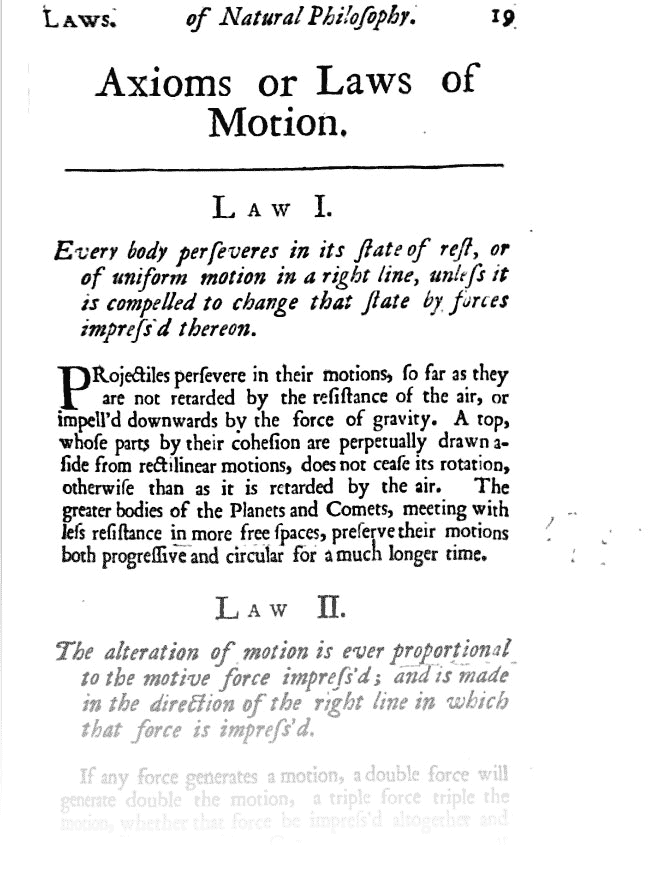How the laws constrain us
The political philosopher Thomas Hobbes thought that if humans were left to ourselves in a state of nature, human life would be "solitary, poor, nasty, brutish and short." People would be killing, stealing, and generally brutalising each other left and right. The only reason we behave with any sense of decency, according to Hobbes, is that we are constrained by laws put in place by the government. It was a rather dim view of human nature. But it was how Hobbes justified the existence of government.

Around the same time, scientists began to talk about laws in science, which they viewed as providing a similar kind of constraint on all natural phenomenon. But unlike the social laws of Hobbes, these laws of nature could never be broken.
Robert Boyle (of Boyle's Law fame) was among the first to notice that there are some major disanalogies between these two kinds of laws. For example, as social creatures, it is our own free choice not to break social laws. The reason they constrain us is that we decide to follow them.

The laws of nature are different. That isn't how they constrain things. A leaf doesn't make a choice to fall. So, what exactly constrains natural phenomena to obey the laws of nature?

This turns out to be a rather tricky question to untangle. But that is what we're going to try to do.
Laws and universal truths
One thing that we might want to say about the laws of nature — whether or not we actually know any of them at the moment — is that they are universal truths about the physical world.
By the physical world we'll mean truths about natural systems like a falling leaf, or a bream of light. We will not generally be referring to the laws of logic or mathematical truths. There may be mathematical laws, but we will be concerned with laws of nature instead.
Laws of nature are very pervasive in science. They have been proposed describe all kinds of phenomena in physics, biology, and the social sciences. Here's just a quick sampling of a few things that get called "laws."
A few putative laws
- Ampère's law
- Archie's law
- Benford's law
- Birch's law
- The Beer-Lambert law
- Charles's law
- Conservation laws
- Coulomb's law
- Curie's law
- Darcy's law
- Faraday's laws
- Fick's diffusion law
- Fourier's law
- Graham's law
- Gresham's law
- Henry's law
- Hooke's law
- Hubble's law
- Joule's law
- Laplace's law
- Law of evolution by natural selection
- Law of supply & demand
- The Malthusian Law
- Mendel's laws
- Newton's laws
- Ohm's law
- Okun's law
- Planck's law
- Raoult's law
- Ricardo's law
- Stokes' law
- The thermodynamic laws
- The Titus-Bode law
- Torricelli's law
- ...etc.
Many of these laws are not universally true, and so might not be deserving of the title. On the other hand, many statements that are not typically referred to as laws might actually deserve the title, such as the Schrödinger equation or Einstein's equations. Our concern is not so much which statements are the real laws, but what makes something a law in the first place.
However, being true doesn't make something a law. For example, the earth has only one moon. That's as true as anything. But it is also somewhat of an accident. If things had been slightly different, the earth might have had two moons, or no moons at all. We certainly wouldn't want to say that a law of nature guarantees that the earth must have only one moon.
So, there must be more to the story about laws that goes beyond universal truth.
Laws and regularities
One naïve first attempt is to suppose that laws characterise regularities. At some point in its history, the earth acquired a moon. But since this was not a regular event, this acquisition is not a good candidate for a law.
On the other hand, the description of the moon's orbit around the earth is a good candidate for lawlike behaviour. That's good, because it reflects how we actually refer to such descriptions. The moon's orbit is described by Kepler's laws and by Newton's law of gravity (and their more modern replacements in relativity theory), which actually are good candidates for laws.
With this in mind, one might propose the following.
Regularity View of Laws. Laws of nature describe natural regularities, in which events of some type A are invariably followed by events of some type B.

An immediate difficulty is that many laws involve idealisations that don't involve actual regularities. For example, we discussed last time how Newton's law of intertia doesn't actually apply to any real systems. But this is not so hard to fix: we must simply replace strict regularities with approximate regularities. Then our regularities will be described by events that approximately of type A being followed by events that are approximately of type B.
Unfortunately, there is still a major problem: many regularities simply aren't laws.
For example, Popper pointed out that the statement, All Moas live to be no older than 50 may be a true regularity, but it is not really law. Moas were a giant flightless bird in New Zealand that went extinct hundreds of years ago. Their short lives may have been due to the regular attacks of Haasts eagles, which were their main predators. But this regularity was not enforced by a law. If Haasts eagles had never arrived in New Zealand, one could imagine the moas would have lived a lot longer.

Another important example of a regularity that is not a law was given by Reichenbach, who noticed it is a regularity that there are no gold masses of greater than 6 tons. In fact, the largest known gold mass appears to be the Golden Buddha, which is 5.5 tons. But of course things could have been otherwise, and a larger Golden Buddha might have been constructed.

Compare this to the statement that there are no uranium-235 masses of greater than 6 tons. This highly volatile radiactive metal is used in nuclear weapons, on the principle that if its mass increases above about 56kg, it will undergo a nuclear fission reaction. And you know what happens after that.
So, in spite of being identical regularities, there is a difference between the fact about large gold masses and the fact about large uranium masses. In particular, there is a reason why we don't observe large uranium masses that goes beyond mere happenstance. That reason is a law of nature.
This failure of the regularity theory can be summarised in terms of the following fact: the laws have a modal character that goes beyond the actual regularities that we observe. The word "modal" refers to "possibilities," and this is missing from the regularity account of laws. In describing only actual regularities, this view fails to describe the way that laws explain what's possible.
Laws as dispositions and powers
How do laws constrain what's possible in the world? Robert Boyle himself thought that God does the constraining. This is in a sense to just give up and not give any explanation at all. We can do better than that.
In its place, Alan Chalmers suggests that we think of laws as dispositions or powers in the world. Why are some things possible and not others? On this view, it is because the world simply predisposed toward certain things and not others. Uranium-235 has a disposition to exist in sizes less than 56kg, and to quickly go critical at sizes greater than 56kg. This disposition captures what we mean when we say the behaviour is law-governed. Since gold has no such disposition, it is simply not law-governed.
It is a bit like having a disposition to always choose the red cofffee cup when it's in the cupboard. There need be no object that constrains this behaviour. It's just a disposition.

Call this view the "dispositional view of laws."
Dispositional view of laws. Laws of nature characterise the dispositions or powers of parts of the world to behave in a certain way.
A difficulty with the dispositional view as stated is that it appears to just avoid the question of how the laws constrain. Instead of providing a substantial answer, the dispositional answer says that they just do.
Chalmers is aware of this concern, and so goes on to characterise those dispositional powers as being causal powers. He calls this special case of the Dispositional View the Causal view of laws. According to this view, the laws of nature just characterise the power of a cause to generate certain effects. In particular, a large mass of uranium-235 has the power to generate critical effects that dramatically reduce its mass, and it is in this sense that it is described by a law. Since large masses of gold do not have any such causal power, they are not descibed by any similar law.
There are many problems with this view. The first is that causes are not yet well-defined. A second and related problem is that the view will not be satisfying to the empiricist. These causal effects are by definition going beyond mere empirical regularities. If causes are not described by any empirical phenomena, then what are they? This discussion of causation is a can of worms that we will open in due time.
A more serious problem is that there are many laws that seem to have nothing to do with any particular causal mechanism, whatever that may mean.
For example, the law of conservation of energy has this character. The MIT professor in the video below knows that his head will be safe, even without giving most of the details about how the earth's gravity interacts with the pendulum in order to direct its motion. The details of that interaction, which seem to be as good a candidate as any for what one might mean by the "causal" description of the system, are not necessary. His safety is already assured by the conservation of energy.
Are laws the axioms of a deductive system?
Strict empiricists will never be happy about having to describe characteristics that go beyond the world that we obseve. To the empiricist, nothing should drive from the assurance of empirical observation. An account of laws that shirks this responsibility is a dangerous and unwarranted prospect.
This has motivated many to demand that laws satisfy the following requirement.
Requirement on an empiricist account of laws
Whatever laws are, they must depend only on the set of all particular empirical facts of the actual world.
This empiricist requirement is sometimes also called that "Humean" account of laws, although it is doubtful that Hume himself advocated such a rule.
The challenge then is to give a truly empiricist account of laws. One contender for such a view is call the Best Systems view of laws, or sometimes the "Mill-Ramsey-Lewis" account of laws, after some philosophers who have advocated something similar.
Best Systems view of laws. A regularity is a law if and only if it is an axiom of the true deductive system that is the best combination of simplicity and strength.
An example of a deductive system is a logical or mathematical system. One begins with a set of axioms or basic assumptions about the system, and then takes the theory to be all the deductive consequences of those axioms. Such systems are often used in science as well: Einstein assumed the relativity of motion, together with the "light" postulate that the speed of light is constant. Most of special relativity is a deductive consequence of these two axioms.
However, a deductive system by itself is a little too broad. For example, we could just take the axioms to be a giant list of all the facts ever observed about the world.
1. Strong but not simple
The world consists of this rock next to that tree, that planet, some wind blowing in this way, a cow, a banana, ... (etc. etc. until all the facts are listed).
This set of axioms is strong, in that it accurately describes the entire world. However, it is so complex that nobody could possibly understand it. Compare that to the following rule:
1. Simple but not strong
Something exists.
This statement is simple, in that it can be expressed in just two English words. But it is not particularly strong, because it does little describe the observed nature of the world.
On the other hand, scientific statements like Newton's law of gravity, the evolution of species, and Schrödinger's equation appear to describe aspects of the world in a way that is the best combination of simplicity and strength. That is what we mean when we say that they are laws according to the Best Systems view.
The Best Systems account has a number of attractive advantages.
- A self-respecting empiricist can believe it.
- It captures the modal character of laws, such as the difference between large gold masses and large uranium masses.
- Scientists actually do tend to refer to the axioms of the best available theory as laws of nature. For example, Newton's first, second and third laws in the Principia were quite literally referred to as "Axioms."

The Best Systems view also has some disadvantages.
- Simplicity and strenght are vague terms. What exactly do they mean here?
- What if there is no best system?
- What if there are multiple best systems — how would we choose?
Think through for yourself whether or not this view seems plausible. Can you propose a better alternative?
(optional) Are there laws in the social sciences?
The laws of nature appear to have the following three basic properties.
- They are true universal generalisations.
- They limit what is possible (they have a modal character).
- They are about the empirical world, and so are not mere tautologies.
Do the social sciences have laws? Social scientists sometimes use the language of laws, though perhaps less often than their counterparts in physics. But as we discussed above, we're not interested in how people use language. We're interested in the nature of laws.
To answer whether or not the social sciences have laws, let's warm up with a concrete example. It is among the oldest and most famous statements in economics, called the law of supply and demand.
The law of supply and demand says that the price of a market commodity increases or decreases with the ratio of demand to supply. For example, if there's a fixed supply of the latest cellphone model, and demand increases, then the law says the price of the cellphones will also increase. If there is a fixed demand and the supply increases, for example by over-manufacturing the product, then the price will decrease.

Notice that there are obvious situations in which this rule doesn't work. For example, if the government might regulate a commodity by controlling the price. Then it doesn't matter what the supply or the demand is; the price is always the same. For this reason, one normally says that the law of supply and demand holds, so long as there is a competitive market.
That "so long as" is called hedging. We say that a law is hedged if it is said to be true except for some non-empty list of exceptions.
Against laws in the social sciences
John Roberts argues that there are no laws in the social sciences. He gives his argument a lovely, clear presentation, of the kind a philosophy essay should always have. It is the following.
John Roberts' Argument Against Social Science Laws
- If there are any social laws, then they are hedged laws.
- There are no hedged laws.
- Therefore, there are no social laws.
This is clearly a valid argument, meaning that if the premises are true, then the conclusion must also be true. But of course, everything rests on these premises. If Roberts is correct about his premises, then he wins — there are no laws in the social sciences. On the other hand, if even one of his premises is false, then there may yet be laws in the social sciences.
So, let's talk about each of the premises in turn. We'll start with the second one.
Premise 2: No hedged laws?
The trouble with a hedged law is that it seems to not be very "lawlike" according to the definition we've been considering.
Go back to the law of supply and demand. We noticed one exception to the law. But there are many, many others. Here are just a few exceptions that could be noted.
- Ignorance. The buyers could be ignorant of the supply, or the sellers ignorant of the demand. In that case, an increase in supply or demand may have now effect on price.
- Irrationality. The sellers or the buyers might be totally irrational, producing, buying and setting the prices of commodities in a haphazard fashion. In that case too, changes in supply and demand do not have the predicted effect on price.
- Empathy. Factors such as empathy might have an effect on price, as when a water salesman in a drought-struck town makes water available for free in spite of the high demand.
And there are more. The danger is that, as the list gets longer and longer, we end up with a statement that basically says, the law of supply and demand is true, except when it is not.
That's not very lawlike, according to our perspective. In fact, it's a logical tautology — so by definition, it's not a law of nature.
But the situation is worse than that for hedged laws. If "hedging" is allowed in the formulation of laws, then there is a worry that hedged laws cannot be empirically tested. For any exception found to such a law could always be avoided by "heading."
From the perspective of Karl Popper discussed last week, this is a very bad feature indeed. For if a hedged law cannot be falsified, then it is hard to see how it can be considered a scientific law at all.
Premise 1: If there are social laws, then they are hedged?
We have seen a sense in which the law of supply and demand is extremely hedged. There is a sense in which this is not uncommon. Rather, it appears to be the typical situation in the social sciences.
When we're talking about the facts of anthropology, of political systems, of economies, or of socieities, there always seem to be exceptions to every rule. According to Roberts, this is really an essential fact about the social sciences. The kinds of social structures they deal with always admit exceptions.
John Roberts makes the idea vivid with the following apocalyptic thought experiment. Take any statement that you might think is a law of social science. It will always be hedged, at least a little. This is because it is always possible that a huge meteor (much like the one that created the moon) will smash into the planet and destroy all social structures. The facts of the social sciences must at least hedge against that possibility.

The example is a little extreme. But it's supposed to show a sense in which hedging is inevitable when stating facts about highly contingent structures like societies. Does this kind of hedging really establish that all social laws are hedged as Roberts suggests?
This question, ladies and gentlemen, I leave to you.
What you should know
- The three basic properties of laws of nature
- Why being a universal truth isn't enough to be a law
- Why being a regularity isn't enough to be a law
- The dispositional and causal view of laws and its shortcomings
- The empiricist requirement of laws
- The Best Systems view of laws and its shortcomings
- (Optionally): The John Roberts argument against laws in the social sciences
Practice Questions










